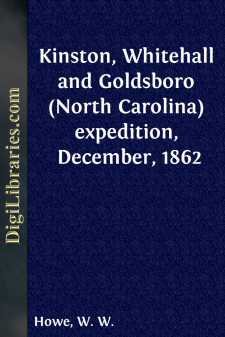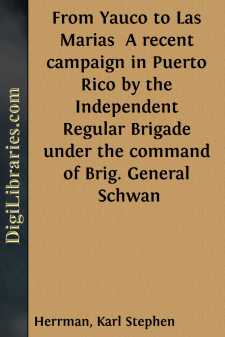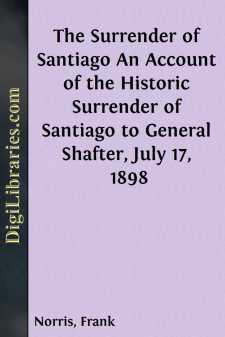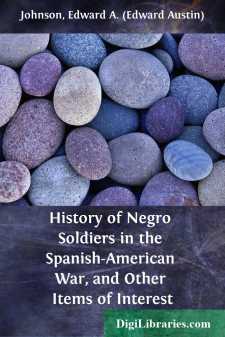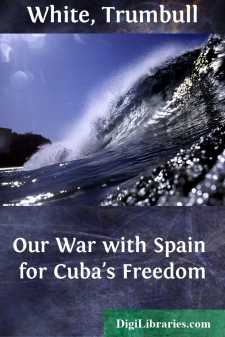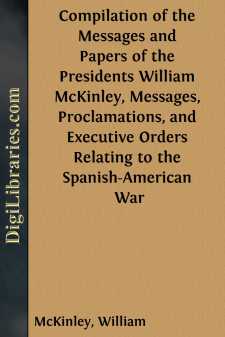History
- Africa 30
- Americas (North Central South West Indies) 50
- Ancient 68
- Asia 58
- Australia & New Zealand 8
- Canada 41
- Caribbean & West Indies 1
- Civilization 20
- Eastern Europe 12
- Europe 310
- Expeditions & Discoveries 60
- General 77
- Historical Geography 1
- Jewish 9
- Latin America 3
- Medieval 8
- Middle East 13
- Military
- Revolutionary 8
- Study & Teaching 5
- United States 353
- Western Europe 56
- World 13
Military Books
Sort by:
Life of Rear Admiral John Randolph Tucker A SKETCH OF THE AUTHOR. JAMES HENRY ROCHELLE, the author of the following pages, and the subject of this sketch, was of French-English and Celtic, or Scotch-Irish, extraction—English through his paternal great-grandmother, who was the daughter of Hinchia Gilliam, and his wife (née) Harrison; Scotch-Irish through his maternal ancestry. The name itself...
more...
by:
A. K. Browne
THE STORY. On Sunday, June 12th, 1864, the U. S. Steamer Kearsarge was lying at anchor in the Scheldt, off Flushing, Holland. Suddenly appeared the cornet at the fore—an unexpected signal, that compelled absent officers and men to repair on board. Steam was raised, and immediately after a departure made, when all hands being called, the nature of the precipitate movement became apparent. Captain...
more...
by:
W. W. Howe
Major General J. G. Foster commenced a movement of his army from New Berne this morning. At 3 p. m. we came upon the enemy's pickets (near our present camping ground), when three prisoners were taken by the advance guard of the Third New York Cavalry. In attempting to press forward we found the road densely blockaded by felled trees; this blockade extended for several hundred yards, being situated...
more...
THE SOUTHWESTERN CAMPAIGN The Southwest became prominent before the nation early in the war from the doubt existing as to the position of Missouri, which was saved by the energy and determination of Frank P. Blair and Colonel Nathaniel Lyon; the latter first capturing Camp Jackson, on May 10th, 1861. He then, picking up what force he could without waiting for them to be disciplined or drilled,...
more...
CHAPTER I The Independent Regular Brigade Place of meetingвÐâForces comprised by the commandвÐâWhy we were not like the VolunteersвÐâCharacteristics of the professional soldierвÐâSketches of the more important officersвÐâWhat we were ordered to do. Yauco, the place selected by General Miles as a rendezvous for the troops of the Independent Regular...
more...
by:
Frank Norris
THE SURRENDER OFSANTIAGO or two days we had been at the headquarters of the Second Brigade (General McKibben's), so blissfully contented because at last we had a real wooden and tiled roof over our heads that even the tarantulas—Archibald shook two of them from his blanket in one night—had no terrors for us. The headquarters were in an abandoned country seat, a little six-roomed villa, all on...
more...
CHAPTER I. THE CAUSE OF THE WAR WITH SPAIN. Many causes led up to the Spanish-American war. Cuba had been in a state of turmoil for a long time, and the continual reports of outrages on the people of the island by Spain greatly aroused the Americans. The "ten years war" had terminated, leaving the island much embarrassed in its material interests, and woefully scandalized by the methods of...
more...
by:
Trumbull White
Information concerning the island of Cuba has been of an exceedingly unsatisfactory character until the search-light of American inquiry was thrown upon it from the beginning of the war for Cuban liberty early in 1895. Although our next-door neighbor to the south, with a perfect winter climate and a host of interesting and picturesque attractions for travelers, tourists had been comparatively few,...
more...
by:
William McKinley
William McKinley William McKinley, the twenty-fifth President of the United States, was born in Niles, Trumbull County, Ohio, January 29, 1843. His ancestors on the paternal side, who were Scotch-Irish, came from Scotland and located in Pennsylvania. His great-grandfather, David McKinley, after serving in the Revolution, resided in Pennsylvania until 1814, when he went to Ohio, where he died in 1840,...
more...
by:
F. W. Reitz
INTRODUCTION. BROTHER AFRICANDERS! Once more in the annals of our bloodstained history has the day dawned when we are forced to grasp our weapons in order to resume the struggle for liberty and existence, entrusting our national cause to that Providence which has guided our people throughout South Africa in such a miraculous way. The struggle of now nearly a century, which began when a foreign rule was...
more...




